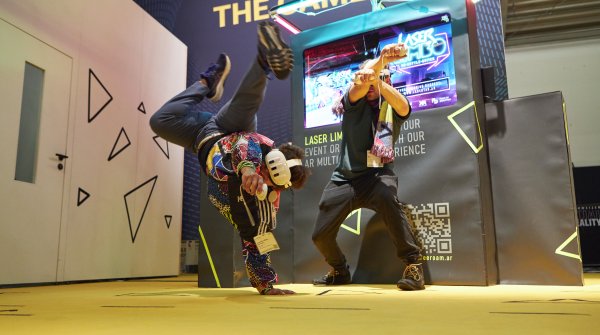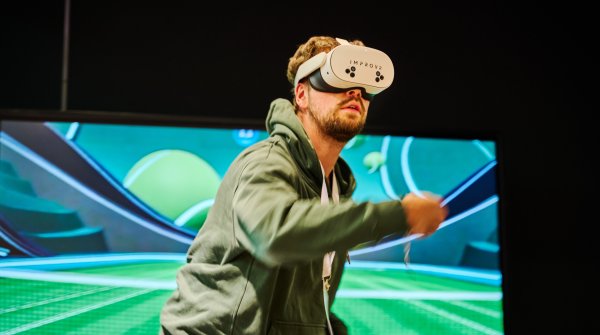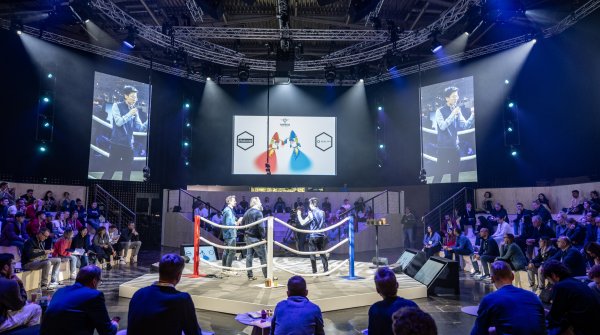- Trend: The comeback of the sportstech industry is picking up speed
- Trend: Big players are revolutionizing the fan experience
- Trend: E-sports are booming, especially in Asia
- Trends: Fitnesstech is the new sportstech locomotive
- Trend: The live experience is exploding in smart stadiums
- Trend: AI optimizes talent scouting and training
Want to know where the Sportstech market is headed? The answers from La Source 2024, Market Research Future Report (February 2024), "Sports Technology Market Size, Share and Trends 2024 to 2034" by Precedence Research (September 2024), "Virtual Sports Market Size | Share and Trends 2024 to 2034" by Precedence Research (August 2024), "Global SportsTech Ecosystem Report 2024" by SportsTechX (June 2024), "Innovation challenges faced by sports organizations" by Teamworks and SportstechX (June 2024), "Global Sports Tech Report H1 2024" by Drakestar (October 2024) and "Sports Technology Market Size by Sport" by The Brainy Insights (August 2023) say the following:
The market will at least double in size over the next few years (see chart I). North America will defend its first place. The other big players, Europe and the Asia-Pacific region, will also grow significantly - and the Middle East is coming: according to the World Economic Forum, the sports industry there is set to grow at a rate of 8.7% by 2026, which significantly exceeds the global growth rate of 3.3%. In South America, Brazil is considered to be the engine of sports tech - and the upcoming market par excellence.

A peak is in sight, but we are still in the valley. "The investment figures are lower than in previous years," says Rohn Malhotra, founder of the market analysis company SportstechX. Start-ups are finding it more difficult to raise capital, investors are concentrating more on existing portfolios. However, there are a few downsides to this trend: the long-term potential of the sports tech market remains strong, as sport is becoming increasingly important as an asset class. How do analysts notice this? Rohn Malhotra says:
- Serious backers are getting in: "More intelligent capital is flowing into the market. These are not billionaires buying a sports team for fun, but serious investors who expect long-term returns."
- The big tech companies are playing along: "Apple, Amazon, Netflix and Google are now investing in sports rights. They are all hungry for content, and sport offers the best content potential."
- Ex-athletes are investing: "Athletes are becoming a new generation of high-net-worth investors targeting the sports market."
- Technology reaches a wider audience: "The democratization of technology is now making tools accessible to a wider audience."

New investments in the sportstech market are therefore decreasing, while merger & acquisition activities are reaching record levels. In the first half of 2024 alone, the total value of company mergers rose to USD 27.3 billion, spread across 225 deals. Example of a significant transaction: US private equity firm Silver Lake acquires the remaining shares in Endeavor for USD 13 billion. The sports and media agency owns brands such as World Wrestling Entertainment (WWE) and Ultimate Fighting Championship (UFC).
Big tech is turning the sports tech market upside down - from media to fan experience: traditional rights holders are struggling with monetization. At the same time, companies such as Amazon are increasingly entering into partnerships for sports broadcasts - and integrating AI. Apple secures broadcasting rights for Major League Soccer and experiments with VR in the NBA. The beneficiaries: the fans. Thanks to AI, fans receive customized content in real time. Companies offer AI-based statistics and personalized commentary during live events. Others analyze live media content to generate highlight clips.
Web3 and blockchain are redefining fan engagement. Supporters enjoy digital collectibles and NFTs of their favorite clubs. New providers of BodyCam technology are putting athletes' perspectives directly on screen. Finally, start-ups are broadcasting more immersively: viewers of gaming events can jump directly into digital arenas as invisible avatars - and follow their favorite players across the pitches.
Speaking of gaming: 2025 will be the first year of Olympic e-sports games. The market is also set to develop. The global size could triple to USD 10.7 billion by 2032 - with an annual growth rate of 13%. "E-sports is growing in the Asian market in particular," explains analyst Aarti Dhapte from Market Research Future. "Young target groups in particular are connecting with this type of sport, as almost everyone has access to a smartphone."

A clear indication of the rise of e-sports: more money. In 2023, for example, e-sports representatives (and fitness technology companies - see trend 4) in particular raised fresh money: e-sports platform VSPO received USD 265 million in funding. Animoca Brands from Hong Kong raised USD 120 million; the company specializes in blockchain-based games. With almost half a billion participants, China is currently the world's largest esports market.
The electronic sports sector becomes big when gambling is included: "Sports betting is the largest and fastest growing sector and accounts for more than 50% of the virtual sports market," says Deepah Pandey, analyst at Precedence Research. In addition to traditional betting, this includes fantasy football, for example. Pandey views this virtual sports market separately from the sports tech market - she predicts that it will be worth over USD 90 billion by 2034.
Sportstech companies 2023: Investments over 100 million dollars
Rank | Company | Location | Company Description | Investment ($M) |
1 | VSPO | Shanghai | Organizer of e-sports tournaments New name since October 2024: Hero Esports. | 265 |
2 | EGym | Munich, Germany | Smart fitness equipment, personalized fitness programs | 225 |
3 | Tonal | San Francisco | Smart home gym | 130 |
4 | Technogym | Cesena | Fitness equipment | 122 |
5 | Animoca Brands | Hong Kong | Blockchain-based gaming, collectibles, metaverse | 120 |
6 | Urban Sports Club | Berlin, Germany | Fitness and sports center booking platform | 105 |
From games to gyms: fitness technologies are on the rise, with investment in fitness tech rising to 43.5% of the total sports tech market last year - a significant increase from 28.6% in previous years. What is also on the rise: B2B solutions, which are now funded at almost the same level as their B2C siblings. Germany is one of the frontrunners: companies such as eGym (provider of smart fitness equipment), Urban Sports Club (booking network for sports and fitness) and Sports Alliance (software for sports and health facilities) received a lot of money.
"The sports industry benefits the most from wearable technology," says Aarti Dhapte from Market Research Future. She explains: "Wearable technology provides athletes and coaches with real-time data on heart rate, speed and exertion, which ensures optimized training plans and better recovery. In soccer, American football, ice hockey and basketball, they help to improve performance and minimize the risk of injury (see Trend 6). One start-up, for example, uses AI-based wearables to provide athletes with real-time insights into injury risks and training results. When it comes to regeneration, another start-up is using wearable devices that accelerate recovery with tiny electric shocks.
Natalia Karbasova also sees preventive health solutions as one of the market drivers. She is the CEO of FitTech Company, which brings together decision-makers from the industry in a business club. "I believe that ecosystems for healthcare in combination with lifestyle devices will conquer the market." Devices such as sleep trackers or ECG analyzers will increasingly contribute to early detection and create sustainable preventive healthcare. Companies are also working on other measurement tools, for example to "enter the untapped market of continuous urine tests."

"This is not just science fiction, but is being driven by large companies such as IBM, Oracle and SAP," explains Shivani Zoting, analyst at Precedence Research. What she means is that providers are relying on AR overlays that superimpose real-time information on gameplay. And this example is part of what analysts call "smart stadium technology". According to Precedence Research, this segment was the largest of the entire sports technology market in 2022 with a share of 43% - and is expected to grow at around 15% per year until 2032. IBM reports that over 80% of fans want personalized content and real-time interactions, particularly through AI-powered technologies.
In addition to augmented reality, the following technologies are being used in stadiums to represent the trend:
- Fans are using a real-time texting platform to book seat upgrades without an app. This makes switching to better seats quick and easy, while stadiums optimize capacity utilization.
- One startup uses AI to analyze the purchase probability index of visitors. Fans receive targeted offers for tickets and merchandise, which personalizes the fan experience and increases sales.
- A new platform connects fans for a shared journey to the match day, a car-sharing service in the sports context.
And from the stands to the pitch: artificial intelligence (AI) is fundamentally changing talent scouting and training. The importance of data-based analyses and AI-based tools is growing rapidly. AI-supported data analysis enables teams to evaluate athletes more precisely and provide targeted support. Athlete Management Systems (AMS) support the monitoring and personalization of training programs and help clubs to develop young talent in a structured way.
Recent examples of this trend:
- One provider uses AI to analyze training data and develop targeted recommendations for athletes - FC Barcelona's youth team is said to already be using it.
- A start-up's LiDAR-based tracking system provides detailed movement data such as acceleration or deceleration.
- A new 3D tracking technology analyzes player and ball movements for performance analysis. By integrating it into the fan experience, it also offers immersive experiences.
Analysts from Market Research Future estimated the size of the market for AI in sport alone at USD 4.6 billion in 2024, with the market set to grow to USD 27.9 billion by 2032. An estimate that includes products for all target groups: Athletes, clubs - and fans. Artificial intelligence, and this is no great surprise, will be everywhere.
 SportsTechVR training: the game changer for athletes?
SportsTechVR training: the game changer for athletes? SportsTechSport meets AI: gamification and more
SportsTechSport meets AI: gamification and more
- Awards
- Mountain sports
- Bike
- Fitness
- Health
- ISPO Munich
- Running
- Brands
- Sustainability
- Olympia
- OutDoor
- Promotion
- Sports Business
- Textrends
- Triathlon
- Water sports
- Winter sports
- eSports
- SportsTech
- OutDoor by ISPO
- Heroes
- Transformation
- Sport Fashion
- Urban Culture
- Challenges of a CEO
- Trade fairs
- Sports
- Find the Balance
- Product reviews
- Newsletter Exclusive Area
- Magazine





